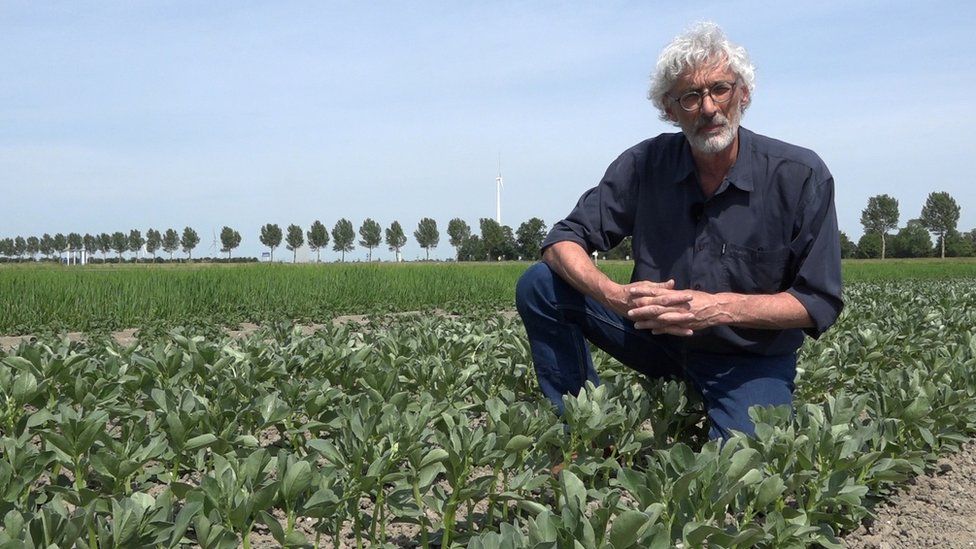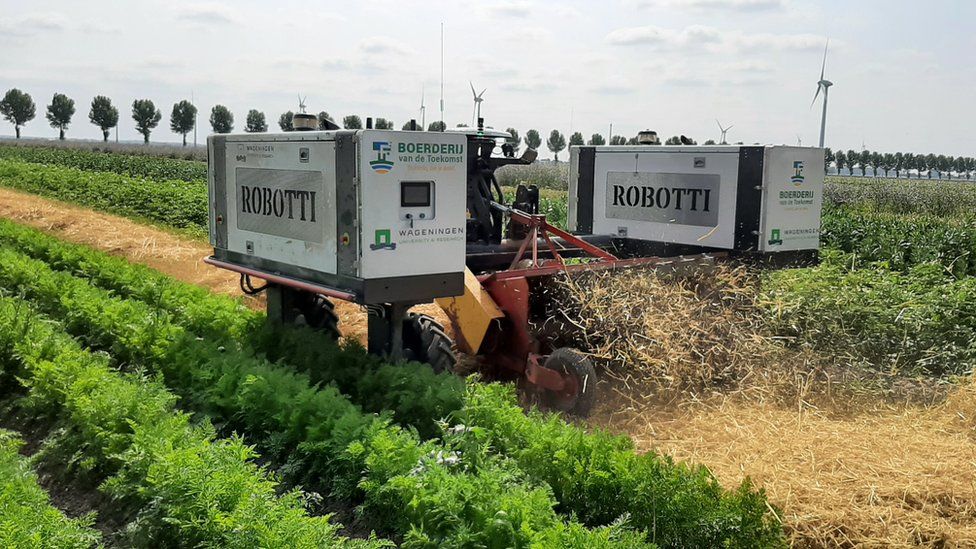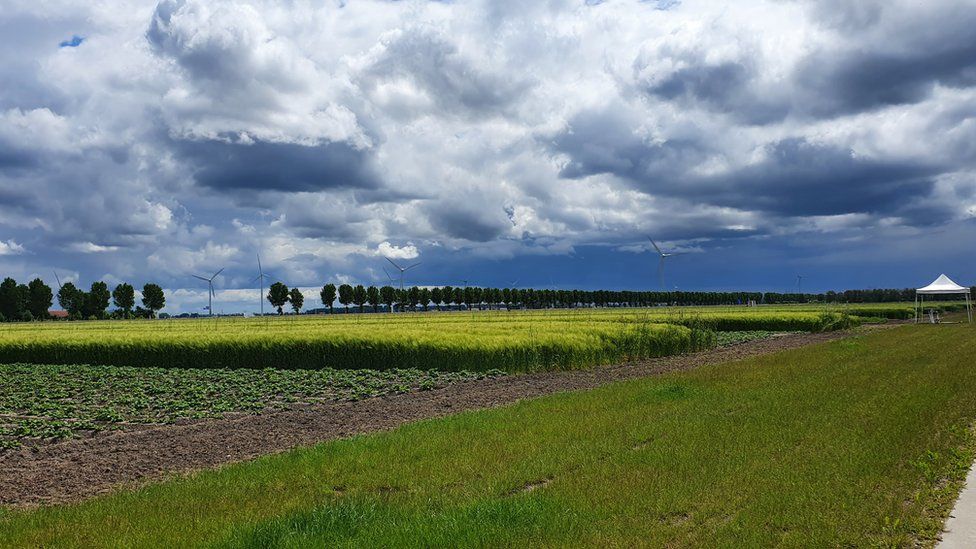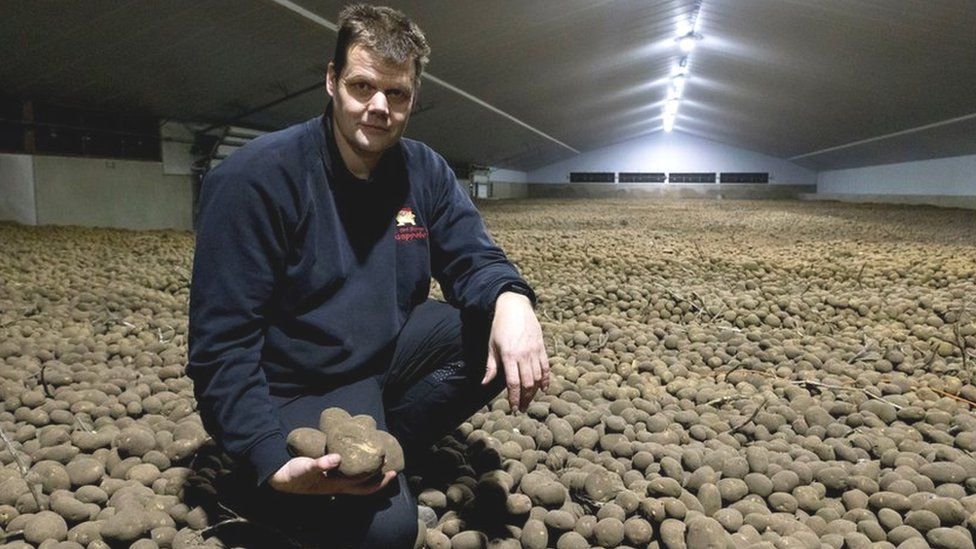New tech boosts Dutch drive for sustainable farming

I’m at the Wageningen University’s Farm of the Future, where I had been expecting to see robots and perhaps, drones flying overhead.
But on a bright blue day project manager Wijnand Sukkel stands in the expansive fields across from the university building with bare trees and of course, windmills in the background, and points at the strips of crops in the fields.
He says usually in the Netherlands these would just be filled by a monocrop such as maize or wheat.
Here in Lelystad, however, they’re experimenting with different agricultural methods including crop diversity, with eight different crops sown here at any one time including wheat, onions, potatoes, and broad beans.
“We know that crop diversity works,” says Mr Sukkel, who adds that they also use cover crops to help improve the soil and biodiversity. “It’s a more efficient use of water, it has lower risk of pest disease, it has a higher biodiversity, it’s better for the soil, and it gives higher yields.”
The world population is expected to reach nearly 10 billion people in 2050, according to the UN. Mr Sukkel and his colleagues are developing sustainable farming systems to ensure there’s enough food for a growing global population, while also working to reduce carbon emissions.
The university started Farm of the Future four years ago after seeing biodiversity decline due to climate change. “We wondered if it was possible to design a high food production farm system with zero fossil fuel energy use, with no damage from pesticides and [that] was resilient to heavy rainfall or very long dry periods.”

The Netherlands is the second biggest exporter of agricultural goods worldwide.
Including animal products, those exports are estimated to have increased by 9.4% to a record €104.7bn (£90bn; $114bn) in 2021, according to Wageningen Economic Research (WUR) and Statistics Netherlands (CBS).
However, producing for such a large export market puts a lot of pressure on the nation’s environment.
So Mr Sukkel and his team are focused on sustainable production. “We need to regenerate soils and regenerate biodiversity. Right now all over the world is large-scale and uniform agricultural production which is very intensive and is killing the soil.”
One of their solutions to combat dry weather has been to create a drainage system which gathers excess water and pumps it underground. “In the winter we have too much water. Now all the water drips into the soil and is caught in the drainage system. We have a big water bubble underground.”
At the Farm of the Future there are perennial flower strips to ensure there’s food and shelter for insects. “If you harvest everything at the same time or plant everything at the same time, it’s an ecological death. They cannot survive.”
The Farm of the Future, which showcases its research and learnings to companies and organisations worldwide, has invested in technology to help its production to be stronger and more sustainable. This includes tech which recognises weeds.
“Instead of spraying everything with the same doses, the machine recognises the weeds from the culture plant and sprays a little [germicide] on it,” says Mr Sukkel.

However, he does say it can be challenging for farmers to invest in technology due to high costs. “For example, one of the bigger potato harvesting machines costs €500,000 (£430,000) and it is only used for four weeks a year.”
The Dutch government has also revealed radical action to tackle environmental damage, outlining ambitions to halve its nitrogen emissions by 2030. One way is through it pushing for livestock numbers to fall by a third, sparking nationwide protests from farmers.
In the southwest of the Netherlands, Jacob van den Borne is a third-generation farmer producing mainly potatoes but also sugar beet, wheat and barley, as well as small crops like parsnips and sweet potatoes across 900 hectares of land. As well as selling at home, he also exports to countries such as England, Germany, Belgium and France.
Mr van den Borne started investing in a wider variety of crops when he noticed the soil quality was deteriorating. An advocate of precision farming, he turned to GPS technology to measure, analyse and research his crops as efficiently as possible in order to achieve a higher yield.

He has invested in soil scanning technology which allows him to map and document every square metre of soil. “It gives me the ability to improve the soil potential and predict which are the good spots and fix the others.”
He is also tapping into sensors and data infrastructure.
“I have spent about €1m on such investment, but I have a rule – don’t invest in new toys before the old ones are paid off.”
He says a key focus for the next year is variable rate irrigation, which provides pre-planned levels of water at controlled times. “This is irrigation on demand. We cannot control the weather but one thing that is really measurable is the weather. If there’s no rain we can add water.”


New Tech Economy is a series exploring how technological innovation is set to shape the new emerging economic landscape.

Mr van den Borne has also invested heavily in disease management. “We have multiple weather stations looking at weather conditions and that can calculate when the crop could be attacked. We then protect just before that moment. It’s like when wearing sun lotion, you don’t put it on much earlier as you will still burn.”
He says he is investing in AI to help provide the answers in the future. “For example, asking questions like if there’s an issue in the field, we can try and figure it out with AI.”
“For me, the farm of the future is all about data, artificial intelligence and learning.”
Meino Smit, who runs an organic farm and wrote his PhD thesis on the sustainability of Dutch agriculture from 1950 to 2015, is concerned that “Dutch agriculture is not currently sustainable”.
“Technology has a negative impact on the environment; the more tech you use, the more it creates a negative impact in the environment,” he says.
“Big machines are very bad for the soil and they use a lot of energy. Tech is not a solution. We need reduced energy use combined with tech and labour.”
Looking ahead to the future, farmers are understanding they need to be more adaptive due to climate change, says Mr van den Borne. “We are producing more efficiently with a lower ecological footprint; it’s not only quantity but also quality.”
Like many farmers, he’s feeling the pressure. “It’s pretty scary but less than 1% of the global population is feeding the rest. It’s quite an important job.”
